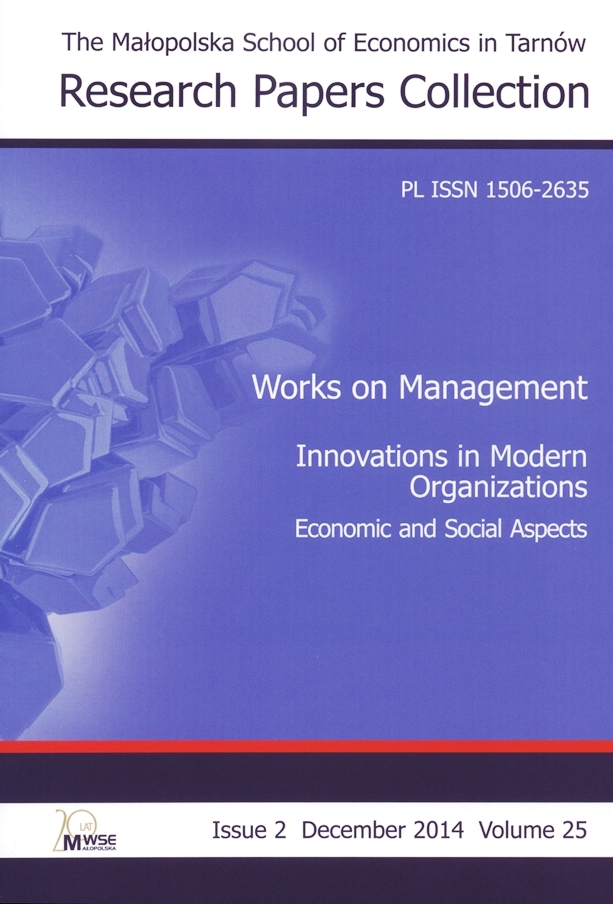Abstract
The purpose of this article is to present the essence and importance of e-learning in the process of organizational learning and the presentation of the model of the company innovation system, as well as to provide the concept of enterprise innovation capacity analysis. This model presents a concept of the analysis of relationship between determinants of organizational innovation and the level of innovation, taking into account the contextual variable that regulates the established relationships, i.e. e-learning. The following determinants of innovation potential and determinants of innovation capabilities have been characterized: knowledge management, modern IT infrastructure, competence of employees, external cooperation in the field of knowledge and information, organizational structures and processes. The empirical part of the article contains findings of the assessment of the degree of innovation of enterprises of the Małopolska, Silesian and the Subcarpathian Regions. It has been stated that the management of knowledge, modern technology and skills of IT workers determine the degree of innovation of the company. A great influence of contextual variable in relation to organizational innovation, i.e. e-learning, has been emphasized.
References
Argyris, C. Schön, D. A. (1996). Organizational learning II. Theory, method, and practice. Reading: Addison-Wesley Publishers. ISBN 0-201-62983-6.
View in Google Scholar
Baron, R. M., Kenny, D. A. (1986). The moderator-mediator variable distinction in social psychological research: Conceptual, strategic, and statistical considerations. Journal of Personality and Social Psychology, 51, 1173‒1182.
View in Google Scholar
Brilman, J. (2002). Nowoczesne koncepcje i metody zarządzania. Transl. by K. Bolesta-Kukułka. Warszawa: Polskie Wydawnictwo Ekonomiczne. ISBN 83-208-1375-1.
View in Google Scholar
Chłodzińska, M. (2010). E-learning a innowacyjność przedsiębiorstw [online, accessed: 2014-03-20]. Retrieved from: http://www.assecobs.pl/INCENTI/en/1682/z.
View in Google Scholar
Gloet, M., Samson, D. (2013). Knowledge management to support systematic innovation capability [online, accessed: 2014-03-12]. Retrieved from: http://www.hicss.hawaii.edu/hicss_46/bp46/ks4.pdf.
View in Google Scholar
Innowacje i wiedza (2006). Biuletyn Informacyjny. Ostrów Wielkopolski: Centrum Innowacji i Wiedzy Innowacyjnej Południowej Wielkopolski w Ostrowie Wielkopolskim, no. 3, p. 2.
View in Google Scholar
Kotler, P. (2004). Philip Kotler odpowiada na pytania na temat marketingu. Transl. by R. Bartołd. Poznań: Dom Wydawniczy Rebis. ISBN 83-7301-577-9.
View in Google Scholar
Kowalewski, T. (2004). Uczelnia jako organizacja ucząca się. In: W. Grudzewski, J. Merski (eds.). Zarządzanie wiedzą istotą współczesnych organizacji inteligentnych. Warszawa: Wydawnictwo Wyższej Szkoły Ekonomicznej w Warszawie. ISBN 83-86990-79-1.
View in Google Scholar
Kozioł, L., Karaś, A. (2013). Innovativeness in tourist companies. Assessment attempt. The Małopolska School of Economics in Tarnów Research Papers Collection. Works on Management, 23 (2), 131–147.
View in Google Scholar
Kozioł, M. (2012). Wykorzystanie e-learningu w procesie szkolenia małych i średnich przedsiębiorstw. Unpublished doctoral dissertation. Kraków: Uniwersytet Ekonomiczny w Krakowie.
View in Google Scholar
OECD (2008). Podręcznik Oslo. Pomiar działalności naukowej i technicznej: Zasady gromadzenia i interpretacji danych dotyczących innowacji. Common issue of OECD and Eurostat. Polish edition based on 3rd ed. Warszawa: Ministerstwo Nauki i Szkolnictwa Wyższego. Departament Strategii i Rozwoju Nauki. ISBN 978-83-61100-13-3.
View in Google Scholar
Pichlak, M. (2011). Moderatory i mediatory innowacyjności organizacji. Współczesne Zarządzanie, 4, 22‒32.
View in Google Scholar
Stabryła, A. (2013). A procedure for evaluating development potential in the area of production capacity. The Małopolska School of Economics in Tarnów Research Papers Collection. Works on Management, 23 (2), 191‒204.
View in Google Scholar
Tidd, J., Bessant, J., Pavitt, K. (2001). Managing innovation: Integrating technological, market and organizational change. New York: John Wiley & Sons Ltd. ISBN 978111995933.
View in Google Scholar
© Copyright by Małopolska School of Economics in Tarnów. The articles are available under the Creative Commons Attribution NonCommercial-NoDerivatives 4.0 International License


